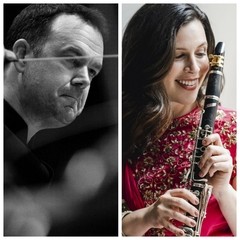|
Back
The Community Ascendant New York
St. Paul’s Church
09/23/2022 - September 24, 2022
Grazyna Bacewicz: Overture
Mike Boyman: Clarinet Concerto (World premiere)
Ralph Vaughan Williams: Symphony No. 4 in F Minor
Angela Shankar (Clarinet)
Chelsea Symphony, Matthew Aubin (Artistic Director/Conductor)

M. Aubin/A. Shankar (© Chelsea Symphony)
“Even when playing a merry tune, the clarinet sounds sad. Were I to dance in prison, I would wish it were to the music of a clarinet.”
André Grétry (1741‑1813)
“It looks wrong and it sounds wrong, but it’s right. I don’t know whether I like it, but it’s what I meant.”
Ralph Vaughan Williams (1872‑1958)
Each time I hear the Chelsea Symphony, I learn something new. Not so much with the playing, which is adequate enough, but their choice of composers. Some new names, some old names with rare finds. Never, though, ordinary.
Last night, in the first of two performances (tonight will include Strauss’s Oboe Concerto), Chelsea Symphony premiered another concerto by Mike Boyman. His Concerto for Two Horns and Wind Ensemble several years ago was not a revelation in music. Yet one anticipated good things with the world premiere of his Clarinet Concerto. Angela Shankar would be the soloist, and she is a stalwart of the Chelsea Symphony.
Then we had another new piece (for these ears), this from the Polish violinist and composer Grazyna Bacewicz. Ms. Bacewicz had been famed in Poland for the first half of the 20th Century. With the invasion of the Nazis into Poland, she left and spent much of her time in America. Her Overture for Orchestra, written in 1943, was a paean–and painful–tribute to her homeland. Finally, we had Vaughan Williams’ rarely played Fourth Symphony, one of his “wartime” pieces, very unlike the usual pastoral composer.
While the choices were fascinating, an evening with the Chelsea Symphony resembles a community, a country fair of music. The Lutheran church is devoid of pictures and images, so one is hardly intimidated by the painted art. The audience is attending a kind of country fair. Everybody knows everybody else, or they are friends with the conductor and young players, who come out during the intermission.
The dark curtain between Art and Audience is evaporated.
And the Chelsea Symphony conductor and Artistic Director Matthew Aubin is fairly folksy, his spoken introductions to the music has an affable twang: when speaking, he is not Pierre Boulez, not even Alan Gilbert. He is your favorite interlocutor explaining the congenial events of the evening.
That homespun atmosphere is deceiving. Mr. Aubin’s long‑time relationship with the Chelsea Symphony shows effects with their alacrity of response. He is animated when necessary (as in the blazing Fourth Symphony finale). He can hold back to allow Ms. Shankar to show how to play the clarinet.
And with the opening Overture, his orchestra might have started raggedly, but Mr. Aubin knew how to move them through Ms. Bacewicz’s music–giving way for a secret sign from the timpani. After all, the composer was politically alert and she understood her country under peril in 1943. So in these six minutes, she produced fanfares from the brass, a series of Slavic‑style dances (at times it sounded like Dvorák), and, surprisingly, a Beethoven Fifth “da-da-da dah” tatoo from the timpani.
Or perhaps it wasn’t the hand of Fate: perhaps this was the Morse Code “V for Victory.” The music and composer were new, but methinks she was clever enough to signal her thoughts.
Mike Boyman’s Clarinet Concerto was played with glittering showmanship by Angela Shankar in this world premiere. One wasn’t astonished by any musical discovery in the conservative language or structure. But with tones of utmost purity–and a pathos in the second movement–it displayed Ms. Shankar’s dexterity and Mr. Boyman’s workmanship.
The one work exemplifying the title “Turbulence” given to the concert was Sir Ralph Vaughan Williams’ Fourth Symphony. Conductor Aubin, in his introduction, appropriately cited the quote given at the top of this review. More than that, Sir Ralph had written a ultimate criterion for any serious artist.
For those weary by the composer’s Tallis, or Lark Ascending (“Shoot that damned bird down!”), the Fourth is a fierce enlightenment of war. Not like Shostakovich’s symphonic rodomontade, attractive as that may be. But a chilling, dissonant and fervent symphony with a series of breathless heartfelt movements.
The Chelsea Symphony and Mr. Aubin were pressed to the limits here, and the results were good, if not shattering. The opening was as discordant as the composer wanted, the second movement was dramatic enough. The scherzo was the composer going back to his felicitous habitual roots.
For the finale, Mr. Aubin brought the Chelsea Symphony to an abrasive, darkly brutal ending, and an opportunity for this community-style orchestra to break into the world of international artistry.
Harry Rolnick
|